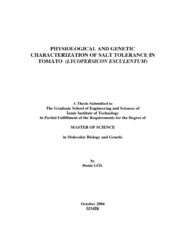Please use this identifier to cite or link to this item:
https://hdl.handle.net/11147/3562Full metadata record
| DC Field | Value | Language |
|---|---|---|
| dc.contributor.advisor | Frary, Anne | - |
| dc.contributor.author | Göl, Deniz | - |
| dc.date.accessioned | 2014-07-22T13:51:48Z | - |
| dc.date.available | 2014-07-22T13:51:48Z | - |
| dc.date.issued | 2006 | - |
| dc.identifier.uri | http://hdl.handle.net/11147/3562 | - |
| dc.description | Thesis (Master)--Izmir Institute of Technology, Molecular Biology and Genetics, Izmir, 2006 | en_US |
| dc.description | Includes bibliographical references (leaves: 59-65) | en_US |
| dc.description | Text in English; Abstract: Turkish and English | en_US |
| dc.description | x, 66 leaves | en_US |
| dc.description.abstract | Plant growth is limited by different environmental conditions. Salt stress is one of these conditions that affects plant growth. Elimination of salt from the soil is time consuming and very expensive. The most effective way to eliminate salinity effects is to produce salt tolerant crops. Both transgenic applications and molecular marker technology are of importance in producing salt tolerant plants. In this study, responses to salt stress of tomato were studied during the germination and vegetative stages of the life cycle. Inbred Backross Lines (IBLs) from a cross between salt-sensitive L. esculentum and a salt-tolerant L. pimpinellifolium were used for evaluation of salt tolerance during seed germination and QTL mapping. At the end of the germination study, it was observed that the IBLs have some degree of salt tolerance. L. esculentum alleles provided improved total percent germination on salt, however, L. pimpinellifolium alleles provided an improved rate of germination on salt. Thus, different parameters of salt tolerance are controlled by different mechanisms during seed germination. L. pennellii introgression lines (ILs) generated by crossing L. pennellii (LA716) to L. esculentum cv. M82 were used to map antioxidant traits related to salt tolerance at the vegetative stage of tomato. Plants of cultivated tomato (M82) and 32 IL lines were grown in aerated Hoagland solution in the greenhouse. At the seven-true leaf stage salt treatment was started and was achieved with the gradual addition of NaCl to the nutrient solution until 150 mM NaCl was reached. Superoxide dismutase (SOD) and catalase (CAT) activities were measured in the leaf tissues of these plants. Enzyme activities of the ILs were compared with M82 and QTLs associated with SOD and CAT activity under control and salt conditions were mapped. | en_US |
| dc.language.iso | en | en_US |
| dc.publisher | Izmir Institute of Technology | en_US |
| dc.rights | info:eu-repo/semantics/openAccess | en_US |
| dc.subject.lcc | SB349. G61 2006 | en |
| dc.subject.lcsh | Tomatoes--Genetic | en |
| dc.subject.lcsh | Plants--Effect of salt on | en |
| dc.title | Physiological and Genetic Characterization of Salt Tolerance in Tomato (lycopersicon Esculentum) | en_US |
| dc.type | Master Thesis | en_US |
| dc.institutionauthor | Göl, Deniz | - |
| dc.department | Thesis (Master)--İzmir Institute of Technology, Molecular Biology and Genetics | en_US |
| dc.relation.publicationcategory | Tez | en_US |
| dc.identifier.wosquality | N/A | - |
| dc.identifier.scopusquality | N/A | - |
| item.openairecristype | http://purl.org/coar/resource_type/c_18cf | - |
| item.languageiso639-1 | en | - |
| item.openairetype | Master Thesis | - |
| item.grantfulltext | open | - |
| item.fulltext | With Fulltext | - |
| item.cerifentitytype | Publications | - |
| Appears in Collections: | Master Degree / Yüksek Lisans Tezleri | |
Files in This Item:
| File | Description | Size | Format | |
|---|---|---|---|---|
| T000579.pdf | MasterThesis | 1.38 MB | Adobe PDF |  View/Open |
CORE Recommender
Page view(s)
250
checked on Mar 31, 2025
Download(s)
96
checked on Mar 31, 2025
Google ScholarTM
Check
Items in GCRIS Repository are protected by copyright, with all rights reserved, unless otherwise indicated.